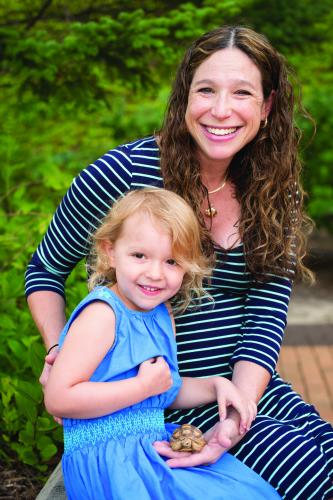Changing the face of science: A Q&A with Meredith Gore
Working to ban the black market animal trade from sea turtles to rhinos.

Despite his adorable appearance, Julius is not your normal household pet. A sulcata tortoise, he will grow to weigh nearly 200 pounds and measure approximately 3 feet in length. He will also live 80 to 90 years. Even more extraordinary, however, is how he came into the life of Michigan State University (MSU) conservation criminologist Meredith Gore and her family.
“In October (2014), I got a call from the U.S. Fisheries and Wildlife Service,” she said. “They had recovered something in the area of 900 turtles and tortoises being smuggled into Michigan for export and were looking for homes to foster them after prosecuting the smuggler and holding the animals for evidentiary purposes. They knew about my work with poaching and animal trafficking, and offered me the chance to care for one.”
Gore said that the black market trade in pet reptiles is enormous, with some animals selling for $60,000 to $70,000. Gore’s work has taken her from Michigan to Indonesia, Madagascar, Namibia and back as she studies the social science factors that influence the trade in animals such as Julius and their parts.
Gore is one of the founders of MSU’s conservation criminology program, the only one of its kind in the world. Her expertise has been indispensable not only in informing public policy, but also in training the next generation of conservation scientists and professionals.
“My students are conducting research all over the world,” Gore said. “One is in Nicaragua studying lobster and sea turtle poaching; another just returned from Sumatra and Indonesia looking at tiger, elephant and rhino poaching; and another is in the Pantanal of Brazil working on compliance with inland fisheries laws.”
A combination of interdisciplinary training, patience and a healthy dose of optimism enable Gore and her students to make a difference in the field, whether on the grand stage of national or global conservation policy or at the individual level, helping creatures in need, like Julius.
“Julius is really just the tip of the iceberg,” Gore said. “There’s no reason I should be a parent to this tortoise. There’s no reason this had to happen. It’s a huge issue that affects us here in the U.S., even though it seems as if it happens only in far-off places.”
 Q&A
Q&A
NAME: Meredith Gore
TITLE: Associate professor, Academy for Global Engagement fellow
JOINED MSU: Post-doc, 2006; tenure-stream faculty member, 2008
EDUCATION: B.A., anthropology, Brandeis University; M.A., environment and resource policy, George Washington University; Ph.D., natural resource policy and management, Cornell University
HOMETOWN: Westborough, Massachusetts
FAVORITE FOOD: Mint chocolate chip ice cream
BEST SONG/GROUP: The Beatles
BOOK I'D RECOMMEND: I’ve been reading a lot of Dave Eggers’ books lately.
COOLEST GADGET: FURminator Deshedding Dog Tool
ON MY BUCKET LIST: Climb Kilimanjaro
PERSON I'D MOST LIKE TO MEET: Dalai Lama
BEST TRIP/VACATION: Mount de Ambre, Madagascar
ON A SATURDAY AFTERNOON, YOU'LL MOST LIKELY FIND ME: Hiking with my dog/taking kids to some activity
RESEARCH DISCOVERY I'D LIKE TO SEE HAPPEN IN THE NEXT 10 YEARS: Cure for B-cell non-Hodgkin’s lymphoma



 Print
Print Email
Email





